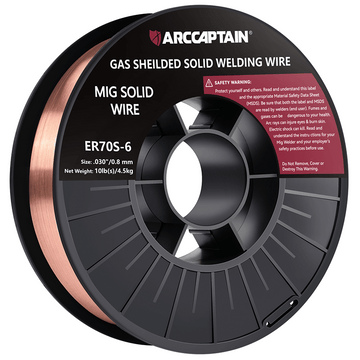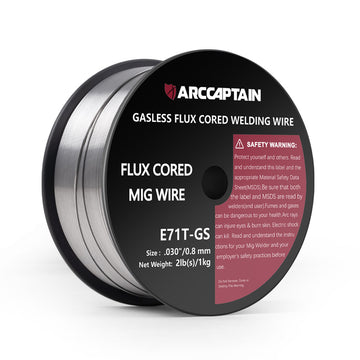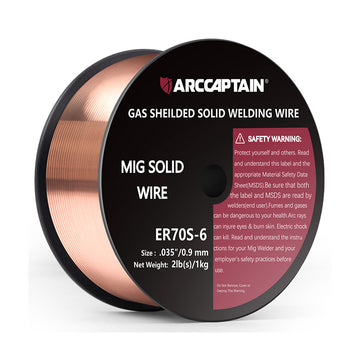.030 MIG Wire
- Características
- Más vendidos
- Alfabéticamente, A-Z
- Alfabéticamente, Z-A
- Precio, menor a mayor
- Precio, mayor a menor
- Fecha: antiguo(a) a reciente
- Fecha: reciente a antiguo(a)
ArcCaptain's handpicked selection combines durability, dexterity, and heat resistance, ensuring you have the right gloves for every type of welding job. Our range offers the perfect blend of safety and performance.
Explore our collection and find the ideal gloves to enhance your welding experience, providing you with the confidence to handle any welding challenge with ease.
Also, don’t forget to complete your welding attire. Check out our range of welding protective gear, heat-resistant welding gloves, and state-of-the-art auto-darkening welding helmets, ensuring you're fully equipped for any welding task.
Excellence With .030 Flux Core MIG Wire
When precision and efficiency are non-negotiable, ArcCaptain's .030 MIG wire emerges as the top choice for welders. Let's explore the features and benefits that make our .030 MIG wire a staple in the welding industry.
All-Position Welding Simplified
-
Suitable for vertical, overhead, and horizontal welding
-
Self-shielded for easy outdoor application
-
Enhances versatility across various welding techniques
Pair with our welding caps for complete head protection during intricate welding positions.
Consistent, Clean Welds
-
Stable arc with minimal spatter
-
TÜV tested premium materials for reliability
-
Ideal for creating strong, clean, and aesthetically pleasing welds
Use in conjunction with our reliable MIG welders to achieve consistently high-quality results.
Unmatched Performance Outdoors
-
No shielding gas required, perfect for windy environments
-
Performs well on rusty, dirty, and painted surfaces
-
Ideal for field jobs and high-altitude projects
Superior Welding Experience
-
Low smoke emission for a cleaner welding environment
-
High feedability for uninterrupted work
-
Vacuum packaging ensures optimal wire condition upon delivery
Complete your setup with our TIG welders for an enhanced and seamless welding experience.
Versatile and Adaptable Wire
-
Perfect for home repairs, fabrication, and automotive work
-
Compatible with a wide range of MIG machines
-
Reliable for both hobbyists and professional users
Recommended Articles To Read
Frequently Asked Questions
How thick of steel can you weld with .030 wire?
Using .030-inch wire for MIG welding is versatile and effective for a range of material thicknesses. Generally, .030-inch wire is suitable for welding steel up to about 1/4 inch thick.
This wire size provides a good balance between penetration and control, making it ideal for both thinner materials and moderately thick steel. For thicker materials, you might want to consider a larger wire size to ensure adequate penetration and weld strength (source).
How does wire speed affect MIG welding?
Wire speed in MIG welding is crucial as it directly impacts the quality and characteristics of the weld. If the wire speed is too high, it can lead to excessive spatter, a high, uneven bead, and poor penetration.
Conversely, if the wire speed is too low, the arc can become unstable, leading to an inconsistent weld and potential burn-back where the wire fuses to the contact tip. Proper wire speed ensures a stable arc, good penetration, and a smooth, even bead.
What size MIG wire is best for sheet metal?
For welding sheet metal, especially light gauge materials, a smaller wire size such as .023 or .024-inch is typically recommended. These thinner wires provide better control and reduce the risk of burning through the material.
When working with sheet metal that is 18-gauge or thicker, .030-inch wire can also be effective and is often used by many welders (source).
How tight should MIG wire be?
The tension on MIG wire should be set so that it feeds smoothly through the welding gun without kinking or slipping. If the wire tension is too tight, it can cause feeding issues and put unnecessary strain on the drive motor.
If it's too loose, the wire can slip, resulting in inconsistent feeding and an unstable arc. A good rule of thumb is to tighten the drive rolls just enough to grip the wire securely without causing deformation.
How to weld thin metal without burning through?
Welding thin metal without burning through requires precise control over several factors. Using a smaller wire size, such as .023 or .024-inch, helps provide better control and reduces the heat input. Additionally, setting a lower voltage and wire speed can help manage the heat.
Employing a series of short welds, known as stitch welding, allows the metal to cool between welds, further preventing burn-through. Keeping the weld pool small and moving quickly can also help manage heat and avoid damaging the thin material



